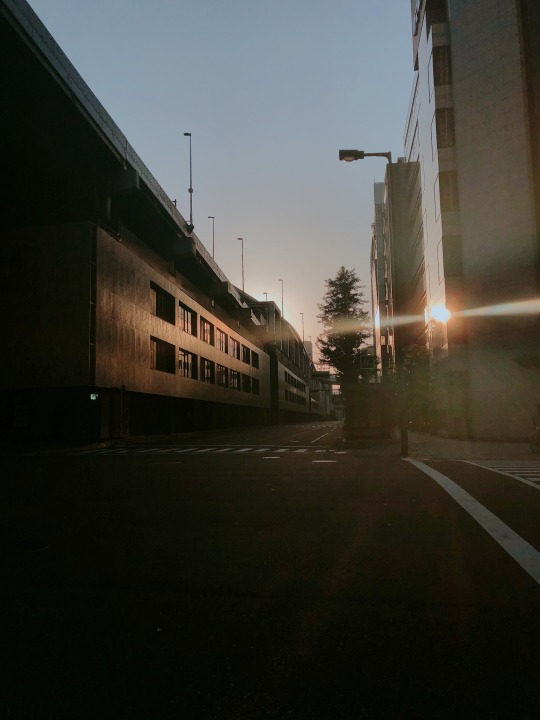Text
Japanese Expressions & Vocabs (2)
ENG | JAP | SINO-VIET
Disclaimer:
I’m currently self-studying Japanese for the JLPT and for improving my fluency and proficiency in general so I’m making notes from textbooks that I’m learning from. I will cite the textbook at the end of the post if applicable.
Occupation - 職業 shokugyou
Unemployed person - 無職者 mushokusha
Company Downsizing - リストラされた risutora sareta
Death from Overwork - 過労死 karoushi
Work - 働く hataraku
I work from home - 家で働く。ie de hataraku
I don’t want to work - 働きたくない。hatarakitaku nai
Rest - 休む yasumu
I’m off today 今日は休みです。kyou wa yasumi desu
I’m going to take a break from the company - 会社を休む. kaisha o yasumu
Commonly mentioned jobs in textbooks
architect - 建築家 kenchikuka - KIẾN TRÚC GIA
assistant - 助手 joshu -TRỢ THỦ
bank employee - 銀行員 ginkouin - NGÂN HÀNG VIÊN
doctor - 医者 isha Y GIẢ
lawyer - 弁護士 bengoshi - BIỆN HỘ SĨ
nurse - -看護師 kangoshi - KHÁN HỘ SƯ || female nurse - 看護婦 kangofu KHÁN HỘ PHỤ
salaryman - サラリマン (office worker)
receptionist - 受付 uketsuke THỤ PHÓ
secretary - 秘書 hisho - BÍ THƯ
accountant - 計理士 keirishi - KẾ LÍ SĨ or 会計士 kaikeishi
writer/author - 作家 sakka TÁC GIA
Other
fisherman - 漁師 ryoushi NGƯ SƯ
hunter - 猟師 ryoushi LIỆP SƯ
farmer - 農民 noumin NÔNG DÂN
real estate agent - 不動産業者 fudousan gyousha BẤT ĐỘNG SẢN NGHIỆP
carpenter - 大工 daiku ĐẠI CÔNG
fortuneteller ・ diviner - 占い師 uranaishi CHIÊM SƯ
clergyman・pastor - 牧師 bokushi MỤC SƯ
Generic Company/Office Related
OL (office lady・female office worker) オーエル o- eru
security guard - 警備員 keibi in CẢNH BỊ VIÊN
salaryman - サラリマン (office worker)
salesman - セールスマン
receptionist - 受付 uketsuke
secretary - 秘書 hisho - BÍ THƯ
accountant - 計理士 keirishi - KẾ LÍ SĨ or 会計士 kaikeishi
Types of Employees - 会社員 kaisha in - HỘI XÃ VIÊN
regular full-time employees - 正社員 seisha in CHÍNH XÃ VIÊN
contract temporary workers - 派遣社員 hakensha in PHÁI KHIỂN XÃ VIÊN
new employee - 新入社員 shinnyūsha in TÂN NHẬP XÃ VIÊN
part time employee - パートタイム従業員 pa-totaimu juugyouin or just パートタイム
Company Hierachy
president (CEO) - 社長 shachou XÃ TRƯỞNG
vice president - 副社長 fukushachou PHÓ XÃ TRƯỞNG
department chief - 部長 buchou BỘ TRƯỞNG
section chief - 課長 kachou KHOA TRƯỞNG
superior - 上司 joushi THƯỢNG CHI
colleague - 同僚 douryou ĐỒNG LIÊU
subordinate - 部下 buka BỘ HẠ
Military 軍
soldier - 兵士 heishi BINH SĨ
navy - 海軍 kaigun HẢI QUÂN
air force - 空軍 KHÔNG QUÂN
First Responder
policeman - 警察官 keisatsukan CẢNH SÁT QUAN
police - 警官 keikan (less formal, shorter version of keisatsukan; can be used interchangeably) CẢNH or お巡りさん omawari-san (friendly term)
firefighter ・ fireman - 消防士 shouboushi TIÊU PHÒNG
Transportation
driver・chauffeur - 運転手 untenshu VẬN CHUYỂN THỦ
station worker・station attendant - 駅員 eki in DỊCH VIÊN
pilot - (1) パイロット (2) 機長 kichou (plane captain) CƠ TRƯỞNG
steward - スチュワード suchuwa-do
stewardess - スチュワーデス suchuwa-desu
Beauty Industry
barber (hairdresser) - 理髪師 rihatsushi LÍ PHÁT SƯ
beauty artist (hairdresser) - 美容師 biyoushi MĨ DUNG SƯ
Criminal Justice
lawyer・attorney - 弁護士 bengoshi - BIỆN HỘ SĨ
judge - 裁判官 saibankan TÀI PHÁN QUAN
detective - 探偵 tantei THÁM TRINH
STEM related
scientist - 科学者 kagakusha KHOA HỌC GIẢ
engineer - エンジニア enjinia
researcher - 研究員 kenkyuu in NGHIÊN CỨU VIÊN
technologist ・ engineer - 技師 gishi KĨ SƯ
Sports Related
coach - コーチ koochi; or 監督 kantoku GIÁM ĐỐC
athlete - 選手 senshu TUYỂN THỦ
baseball player - 野球選手 yakyuu senshu DÃ CẦU TUYỂN THỦ
soccer player - サッカー選手 sakkaa senshu
figure skater - フィギュアスケート figyua sukeeto
Hospitalities/Customer Services Related
waiter
waitress - ウエイトレス
clerk - 店員 ten’in - ĐIẾM VIÊN
cook - コック kokku (I know...I’m a bit surprised too; apparently it’s taken from Dutch)
chef - シェフ shefu
cook・chef - 調理師 chouri shi (cooking master) ĐIỀU LÍ SƯ or 料理人 ryouri nin (cuisine person) LIÊU LÍ SƯ
head chef - 料理長 ryouri chou LIÊU LÍ TRƯỞNG
bartender - バーテンダー baatendaa or バーテン
patissier ・pastry chef - パティシエール patishieru or パティシエ patishie
barista - バリスタ barisuta
baker - パン屋 panya (this can mean both a baker and a bakery lol)
Healthcare Related
nurse - -看護師 kangoshi - KHÁN HỘ SƯ || female nurse - 看護婦 kangofu KHÁN HỘ PHỤ
dietician - 栄養士 eiyoushi - VINH DƯỠNG SĨ
dentist - 歯医者 haisha (casual) XỈ Y GIẢ or 歯科医 shikai (formal) XỈ KHOA Y
doctor - 医者 isha Y GIẢ
Education Related
college student - 大学生 daigakusei ĐẠI HỌC SINH
graduate(s) - 卒業生 sotsugyousei TỐT NGHIỆP SINH
student - 学生 gakusei - HỌC SINH
principal - 校長先生 kōchō sensei HIỆU
professor - 教授 kyōju GIÁO THỤ
teacher - 教師 kyoushi (occupation) or 先生 sensei (title) GIÁO SƯ
teaching assistant - TA
tutor - チューター
lecturer - 講師 koushi GIẢNG SƯ
Politics & Government Related
prime minister - 首相 shushou - THỦ TƯỚNG
politician - 政治家 seijika CHÍNH TRỊ GIA
civil servant・government worker - 公務員 komuin CÔNG VỤ
governor - 知事 chiji CHI SỰ
diplomat - 外交官 gaikoukan NGOẠI GIAO QUAN
Showbiz Related
actor - 俳優 haiyū BÀI ƯU
actress 女優 joyū NỮ
actor・actress・performer - 役者 yakusha (genderless) DỊCH GIẢ
cast - キャスト kyasuto
singer - 歌手 kashu - CA THỦ
celebrity - 有名人 yūmeijin HỮU DANH NHÂN
producer - 演出家 enshutsuka DIỄN XUẤT GIẢ
movie director - 監督 kantoku GIÁM ĐỐC
Communication/Media
journalist - ジャーナリスト jaanarisuto
reporter - (1) レポーター repootaa (2) 記者 kisha
Travel
guide - 案内人 an’nainin ÁN
tour conductor ・tour guide - 添乗員 tenjouin THIÊM THỪA VIÊN
Visual Art & Performing Arts Related
animator - 動画 家 dougaka or アニメーター animetaa
lead animator - 原画家 gengaka ĐỘNG HỌA GIA
architect - 建築家 kenchikuka - KIẾN TRÚC GIA
artist - 芸術家 geijutsuka VÂN THUẬT GIA
illustrator -イラストレーター
manga artist (cartoonist) - 漫画家 mangaka MẠN HỌA
potter - 陶芸家 tōgeika ĐÀO VÂN GIA
pianist - ピアニスト
painter - 画家 gaka HỌA GIA
photographer - 写真家 shashinka - TẢ CHÂN GIA
public speaker ・orator - 演説家 enzetsuka DIỄN THUYẾT GIA
performing musician - 演奏家 ensouka DIỄN TẤU
sculptor - 彫刻家 choukokuka ĐIÊU KHẮC GIA or 彫物師 horimonoshi ĐIÊU VẬT SƯ
tattoo artist - 彫師 horishi ĐIÊU SƯ
wood sculptor - 木彫師 kiborishi MỘC ĐIÊU
Literature Related
poet - 詩人 shijin THI NHÂN
writer/author - 作家 sakka TÁC GIA
Humanitarian Related
archaeologist - 考古学者 kōkogakusha KHẢO CỔ HỌC GIẢ
historian - 歴史家 rekishika LỊCH SỬ GIẢ
translator - 訳者 yakusha DỊCH GIẢ
interpreter - 通訳 tsūyaku THÔNG DỊCH
#japanese#learning japanese#japanese vocabulary#japanese vocab#japanese language#japanese langblr#langblr#japanese notes#sino viet#language blog#language study#studyblr#japanese studyblr#studywithaeli#studywithme#stuydyspo
14 notes
·
View notes
Text
Japanese Expressions & Vocabs (1)
Disclaimer:
I’m currently self-studying Japanese for the JLPT and for improving my fluency and proficiency in general so I’m making notes from textbooks that I’m learning from. I will cite the textbook at the end of the post if you’re interested.
Pronouns
First person (”I”)
- 私(わたくし)watakushi (very formal)
- 私(わたし)watashi (polite)
- 僕(ぼく)boku (plain/used by men)
- 俺(おれ)ore (rough/used by men)
Second person (”you”) (singular)
- (n/a for very formal) -> it’s common to not use second person pronouns when addressing someone, especially in very formal situation. The format NAME-san is commonly used.
- あなた anata (polite)
- 君(きみ)kimi (plain/used by men)
- お前(おまえ)omae (rough/used by men)
Third person - may be used in almost any situation, formal or informal. However, should not be used in reference to social superiors or young children. あの人(あのひと)ano hito can also be used to mean he or she; might carry a negative nuance.
- 彼 (かれ)kare (=he)
-彼女(かのじょ)kanojo (=she)
Plural forms of personal pronouns, add suffix -tachi or -ra
- watashi => watashi-tachi (or watashi-ra)
- boku => boku-tachi (or bokura)
- kimi => kimi-tachi (or kimira)
* kare => karera (or, less frequently, kare-tachi)
- kanojo => kanojo-tachi (or kanojora)
* anata => use suffix -gata for politeness = anata-gata
The suffix -tachi and -gata may also be added to certain nouns: gakusei-tachi (=students), sensei-gata (=teachers), etc.
Japanese Sentence Patterns for Effective Communication (A self-study course and reference) by Taeko Kamiya
#japanese#learning japanese#japanese grammar#jlpt#japanese expressions#taeko kamiya#japanese learning#language#language study#langblr#lang#studyblr#japanese notes#japanese pronouns#japanese vocabulary#japanese basic
143 notes
·
View notes
Text
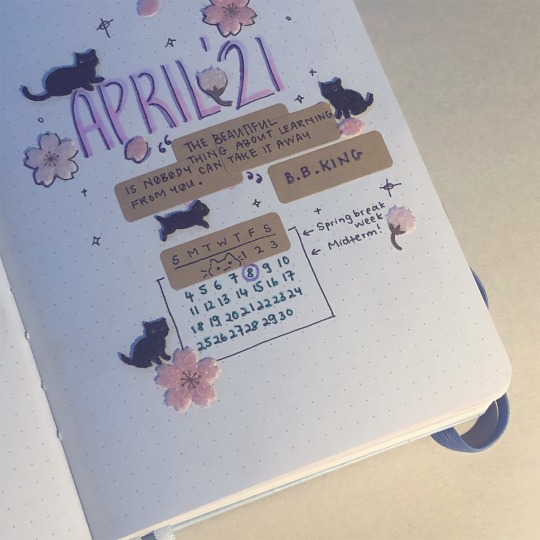
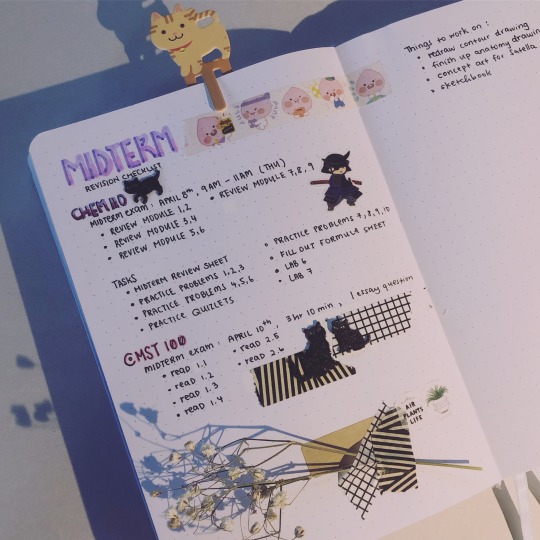
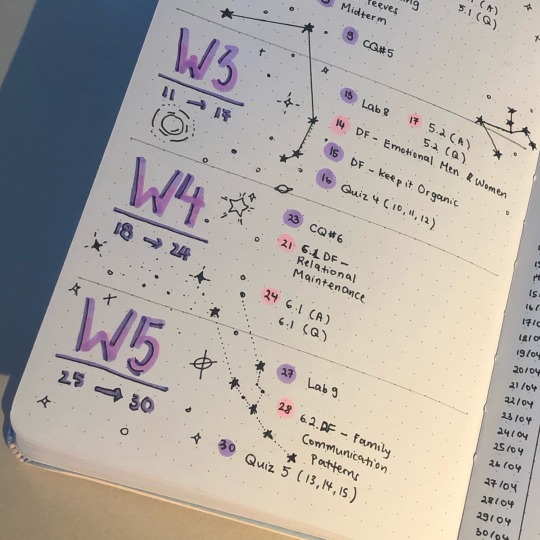
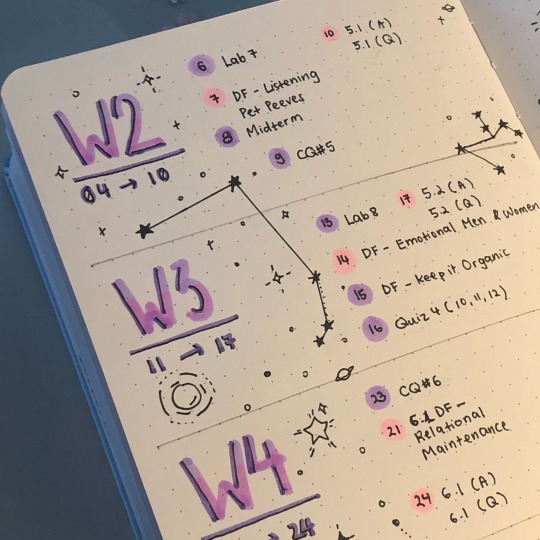
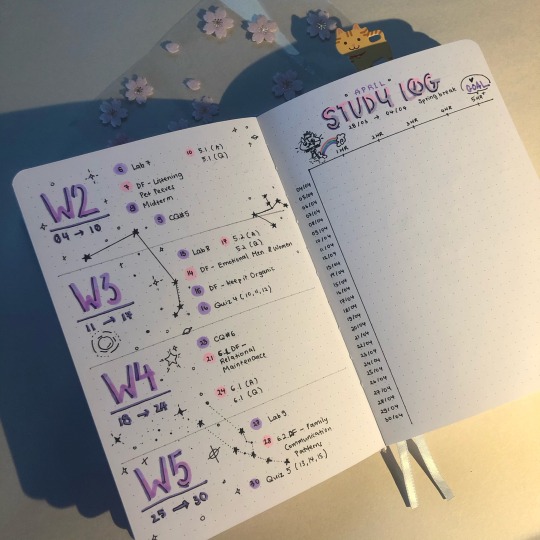
This is by far my favorite bullet journal of all time! 🌈✨🌿🐈🐇It’s a beautiful collab between @notebooktherapy and @milkkoyo on Instagram.
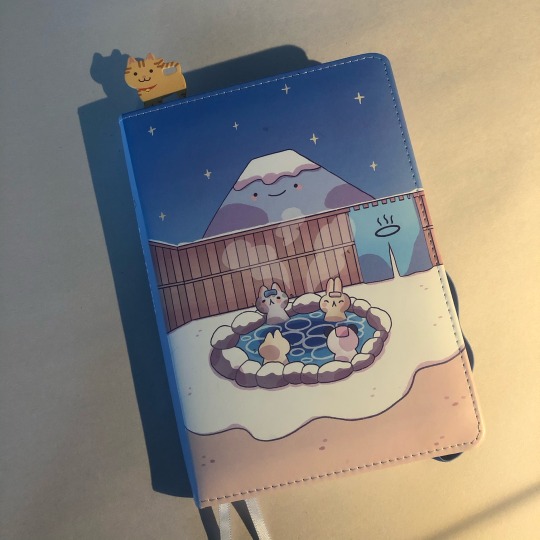
#tnclonewolf#studyblr#bullet journal#bujo#bujo spread#bujoinspo#bujoaddict#bujogram#bujo aesthetic#aesthetic#notebooktherapy#milkkoyo#cute stationery
20 notes
·
View notes
Text
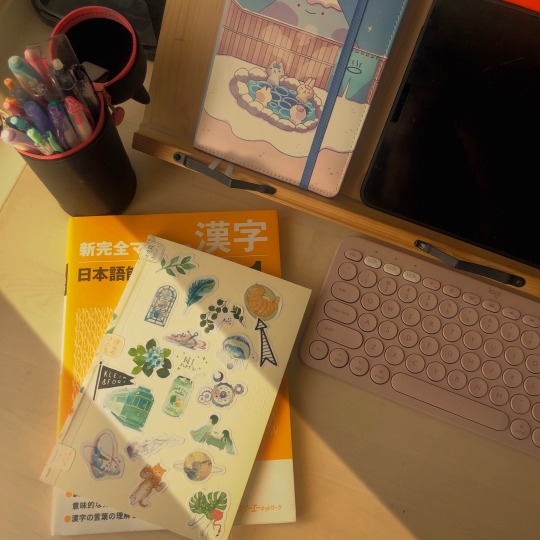
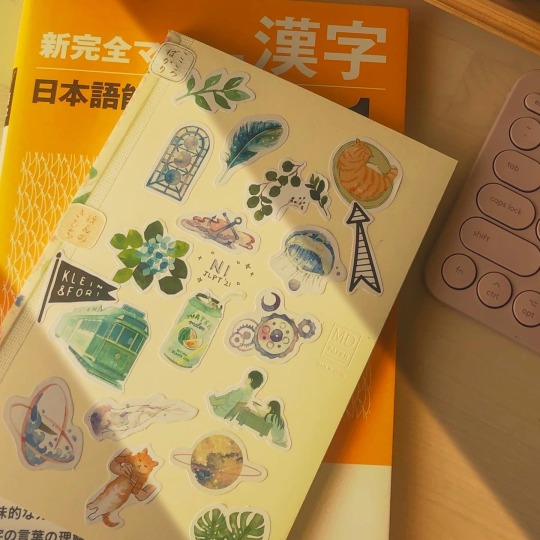
Day 1 of studying for JLPT N1 🌟 Anyone studying for the Test in December 2021? Wish you all the best of luck.
Cute bunny and kitty bullet journal: @notebooktherapy x milkkoyo
White A5 grid Midori MD notebook
Textbook: shin kanzen jlpt n1 series (Kanji)
.
.
.
Can you tell that I faked the sunset effect? 🤣
#studyblr#japanese studyblr#tnclonewolf#japanese notes#illustrative#student#illustrativepsyche#illustration major#JLPT#jlpt1#study motivation#studyspo#langblr#aesthetic#studying#grinding
59 notes
·
View notes
Text
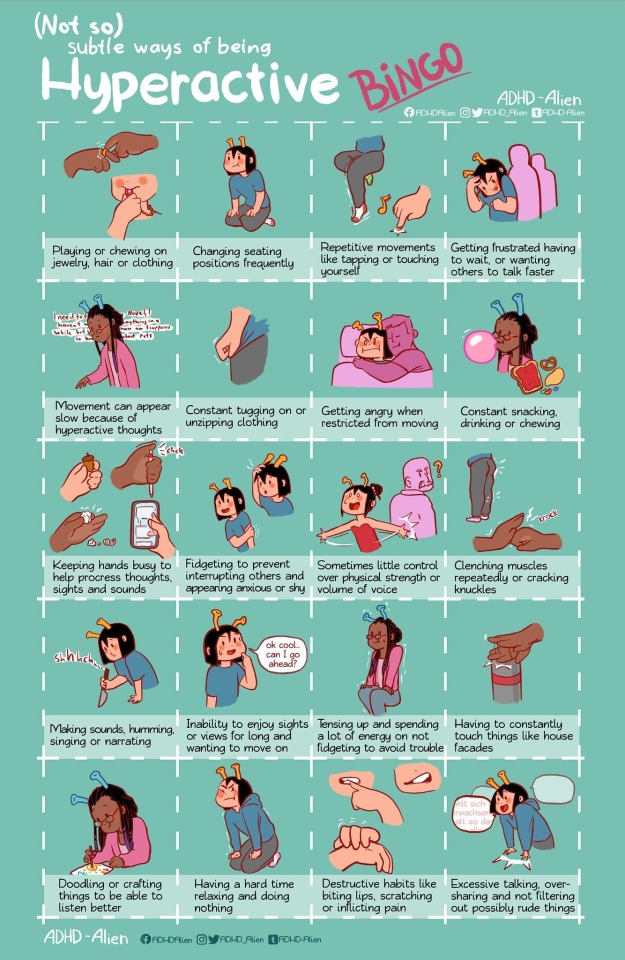
I used to think I can't have ADHD because I wasn't hyperactive.
Not everyone can allow themselves to act on their hyperactivity, so we find ways to redirect or hide the understimulation.
(Sneak introduction to the new inattentive Alien! A hommage to a collab I did with René ♥️)
If yo u’d like to support my work, check out my patreon :)
37K notes
·
View notes
Text
The incorrect and negative beliefs we can get from years of negative feedback not knowing we have ADHD or how it affects our lives. While not everything is solely caused by ADHD, it can affect us and our comorbidities in many, many ways. Good news is, treating ADHD can do wonders for Anxiety and Depression!


84K notes
·
View notes
Text
How to Study History (at uni)
Hi everyone! Now that I’ve (almost) finished my masters and have thus been a history student for four years, I thought this would be the best time to make a post with four tips about how to study history. I studied in the UK, but hopefully these tips will be helpful wherever you are in the world!
1. Do. Your. Damn. Readings.
97% of the work for a history degree is individual. If you ask me to describe my degree in one sentence, it would be “me, alone in a room, reading”. If you study history (but I think this goes for most humanities subjects), you need to do your reading, cause otherwise, you will literally do no work at all. Whether it’s for an essay that’s worth 80% of your final grade or for an optional seminar, always, always do the reading- there have been countless moments when I’ve either been the only person in the seminar who kind of knew what was going on, or when I’ve gotten extra marks during an exam because I knew a random fun fact from some extra reading I had done. So please, please do your reading.
2. Go to all your classes, you won’t have many!
Over the past four years, I’ve had anywhere between 8 and 3 hours of class a week. If you decide not to show up to the few hours you do have to be at uni for, not only will you be extremely unpopular with your lecturers, but it’ll also be such a waste of the time, effort, and money you’re putting into uni. I always calculated at the beginning of the year how much I was paying per hour of class. Trust me, it’s a lot harder to skip when you know you’re wasting £100 every hour you don’t go!
3. Pick essay topics you genuinely like (even if the lecturers hate it)
I vividly remember a lecturer telling the class we shouldn’t write essays about witches because he had read so many that he absolutely despised the topic now. Me being me, I listened to him, and it took me four years to, eventually, write an essay on the topic. Which I loved. If it hadn’t been for that guy, I would’ve discovered this interest so much earlier, and I now wish I’d just trusted my gut and gone with the topic that spoke to me the most. Always pick an essay topic you like, otherwise writing the essay will feel more like a punishment than fun, which is what it should be. This is the time to let your personality shine! I’ve written two essays on Pocahontas because I LOVE the Disney movie and, let me tell you, I enjoyed those way more than when I listened to what the lecturers wanted. You do you boo!
4. Have some fun!
I’m notorious for making up the weirdest essay (sub)titles and/or introductions. The first essay I ever turned in (on the economy of marriage in Pride and Prejudice) contained the lyrics “girls don’t like boys, girls like cars and money” from a song by Good Charlotte. And, to be honest, my jokes haven’t improved much in four years, as is evidenced by the fact all the subtitles in my essay about pirates were quotes from Pirates of the Caribbean movies. Do I love thinking of those things? YES. Do I care whether others (lecturers/students) judge me for it? NO. Again: show your personality! My undergrad dissertation had chapter titles all taken from the song Lady Marmalade (the thesis was about prostitution), and guess what, my supervisor loved it. More importantly, so did I!
I hope these ramblings were semi-helpful! If you have any other questions or just want to have a chat about studying history (or scream about your fav historical figure I’m up for that too), feel free to message me!!
1K notes
·
View notes
Text
not so much study tips, more thoughts on university/studying in general
although these posts are abundant, i like to have my own collection of study tips/uni thoughts
- i’ve been viewing my studies as an office job, mostly because of the 9 to 5 mentality. i am not one for night studying, i have tried and tried and felt guilty when i heard others talk about their late night study sessions, but it is just not for me. which is fine, because with this 9 to 5 idea i have created working days for myself and i can use my evenings for extracurriculars, books, friends, netflix
- the train has (weirdly) become one of my favourite study spots. of course this really depends on the public transport you use. i am on a train for two hours a day, no transfer, and i either go to a silent area (have not yet seen this elsewhere, but dutch trains have carriages in which there is complete silence) or i put in my earpods. i love this because when i come home, i have already done so much work, e.g. organized my lecture notes of that day, inserted my professor’s comments into my paper etcetera
- although i’ve also learned to recognize when i am just done. sometimes i have had enough and it is way better to accept that and then i either listen to some music and stare at the passing landscape, or i watch an episode of the crown. when feeling exhausted, there’s no point in pushing and forcing yourself
- this goes for many many aspects: comparison will kill you. it is often still my tendency to compare myself to others on all levels - grades, kindness, clothing, weight, work ethic - but i make the effort to not ‘indulge’ in it. what my therapist told me has really helped: just notice that the urge to compare is there but then leave it be. like it’s a tiny spider crawling on your leg; you don’t have to do something with it
- on the topic of work ethic: don’t listen to your fellow students. don’t listen to what some wonderful academic says (online). don’t even listen to what your professors say regarding study hours. it has often made me feel very uncertain, but i think it is way better to figure it out yourself. to build up a feeling of trust towards yourself, so you can really start to notice, to feel, when you have done enough. that is something only you should be able to judge and not some external source
- sometimes i get overwhelmed with this sensation that i have not done enough, that i am lazy and have accomplished nothing. however, every (every!) time i have noticed this to be untrue. so perhaps i have not studied every chapter, but i have studied other chapters. i found the cliché of looking at what you have done to really be true. it helps me put things into perspective, i think we can really underestimate ourselves in how much work we have done. what you consider to be 20% may actually be 60%
- motivating internal monologues are completely normal and actually very good! give yourself that motivating speech, it’s like a snow track that becomes deeper and clearer everytime you repeat it
it helps me to look back on these at times, has been in my concepts for a while now (like some kind of motivating internal monologue) but i want this to have a place on my actual blog, because i believe tips like these (less focused on studying and more on coping with the whole world of studying/academia) are important as well
3K notes
·
View notes
Text
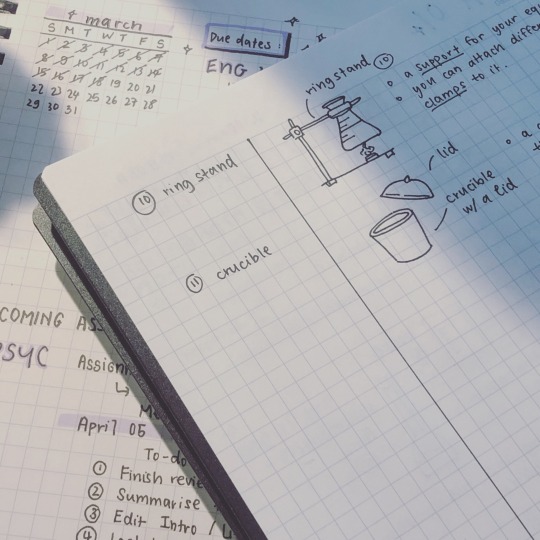
Quarantine diary #1
19/3/2020 ✨🌿
Catching up on all of the modules using Study.com while listening to audiobook 10 steps to earning awesome grades (while studying less) by Thomas Frank.
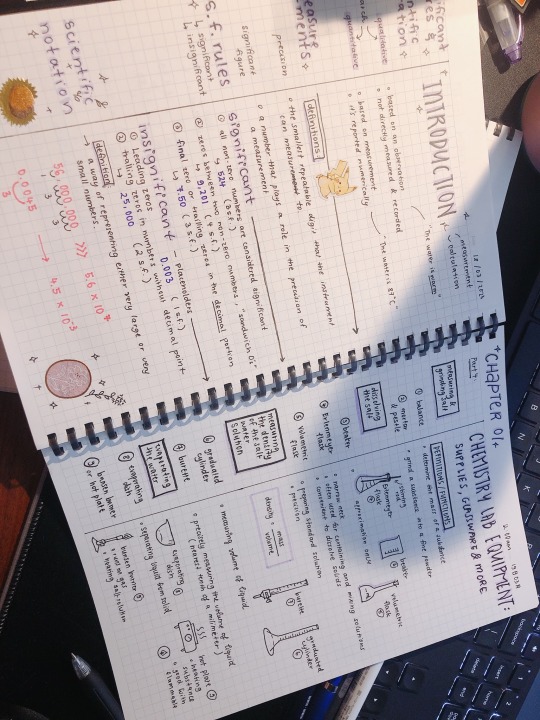
#study day#studyblr#tnclonewolf#study blog#chemistry#chem notes#gridlines#notebook#stationery#college#college student#psychology major#gen chem#study.com
10 notes
·
View notes
Text

August 23, 2019
I have been staying off Tumblr for quite a while.
A lot of things have changed. I have moved from Osaka, JP to Orange County, CA. I am rapidly approaching the age of 22. I’ve changed my major to Psychology and in a highly possible future, I will earn a Bachelor of Science, instead of Art. IKR? Insane.
In just less than a year in the US, I’ve...
... built my very first PC. Very proud.
... adopted three stray cats. (More like kidnapping them, but let’s talk about being ethical later) not one, not two but three freaking soldier, bombarding my place and without fail turning it into a landfill as an aftermath, EVERY. SINGLE. DAY.

... took the driving written and drivng exam.
... gotten my first ever driver license.
... gotten my first car.
... crashed my very first car. And yeah total loss.
... started gardening again. The seeds sprouted, surprisingly. Thought it would be total loss again.
... had ‘the talk’ with my Dad, especially after he now wanted to act fatherly towards me.
... came out to my Dad.
... reconnected, well more like renewed my relationship and rediscovered my feelings for someone special. Fucking gotten confused along the way. Still am tho.
... reconnected with an old dear friend whom I went cold with because of mutual friends dramas.
... made some new friends, one unexpectedly endearing.
... helped out at mom’s wedding photoshoot.
... volunteering at the Library
... Gotten three A’s on my first semester... Couldn’t believe it. Felt unbelievably good when hard work is paid off.
I want to be back to posting and this time I’ll try to make it regularly.
#tnclonewolf#8 months recap#accomplishments#i want to be back#i want to change#for the better#i want to be proud of myself#i want to be able to love myself
1 note
·
View note
Text





Kyoto 🍁2018
清水寺の紅葉🍁めっちゃ綺麗だった
2018年11月23日
#紅葉#紅葉2018#紅葉狩り#京都#京都府#京都旅行#清水寺#関西#autumn leaves#fall#foliage#red leaves#fall colors#japan#kyoto#kyototrip#kyoto temple
3 notes
·
View notes
Text
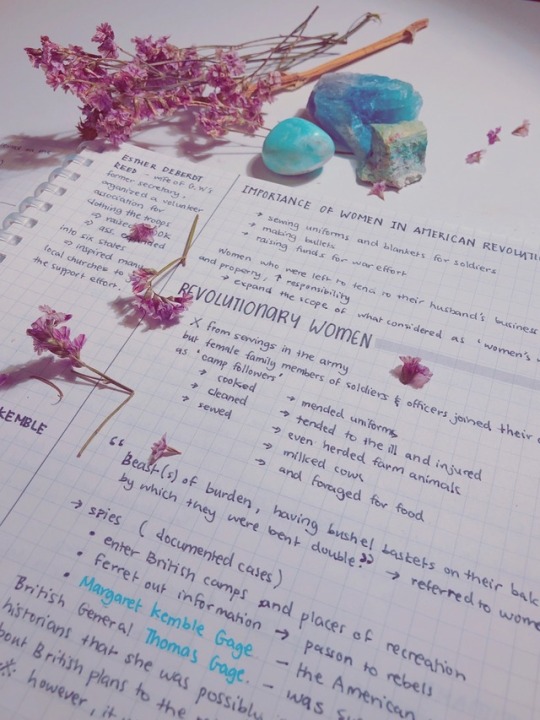
22/11/2018
I love these women’s stories and how they took their collapsed husbands’ positions and continued fighting the battle. Mary Ludwick Hays and Magaret Corbin.
I also love how the subjects I am studying due to curiosity just happened to be the compulsory courses I will be taking in the upcoming year when I return to school.
#studyblr#tnclonewolf#studygrammer#study hard#study notes#study online#khan academy#us history#ap us history#ap us government#no longer in school#revolutionary war#勉強#勉強垢#勉強垢さんと繋がりたい#勉強垢さんと仲良くなりたい#勉強垢さんと一緒に頑張りたい#勉強ノート#ノート#手書き#handwriting#studytime
15 notes
·
View notes
Text
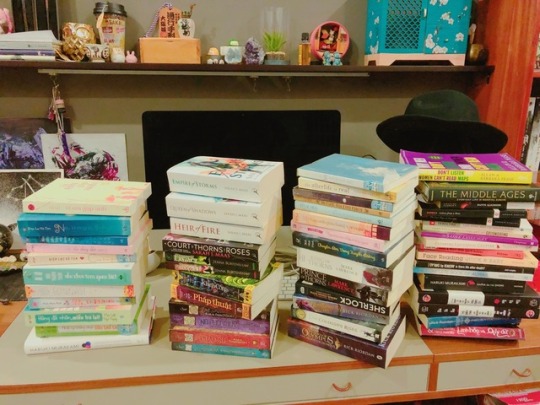
Update from home 2/11/2018
I actually have less books unread than I anticipated. Still 63 in total is still a daunting number 😂
365 days Ultimate all book Challenge #aelichallenge
5 notes
·
View notes
Text
Super In-depth Reviews of Least Kanji-like Kanji Based on Appearance
This will be not-so-serious critiques of weird kanji that don’t look a whole lot like kanji I’ve found before. I have provided the main くんよみ for most kanji, but if one has no kun'yomi, the 音読み was listed. Thanks for reading.
凹
What is this… thing. It looks like someone tried to make a blocky smile for a 顔文字 (example: ( ^凹^)ガンバッテ! ) It’s stupid but I can use it for that so not terrible. Plus, it does truly embody its meaning of concave. (Read as ぼこ) 6/10
凸
This is an actual tetris block.. wonderful. But like the last kanji, it does capture the pith of its definition, namely convex. Similar 顔文字 potential sooo… (read as でこ) 7/10
兀
Pi but without a funky curved hat, thus it’s worse. (means high/lofty, read as こつ) 4/10
丗
This is a living nightmare. Seems as though someone wrote 甘 but made one stroke vertical instead of horizontal by mistake. (means 30, read as さんじゅう) 2/10
廿
A perfect unorthodox kanji. It looks like a combination of two 十’s and a 二, which is accurate to the meaning of it. Plus, it’s aesthetically appealing. (means 20, read as にじゅう)10/10
卌
The worse of these 3 used to represent groups of ten. I almost feel abd for it but that doesn’t reflect in the rating. (means 40, read as よんじゅう) 1/10
卉
Another character without grass that looks bizarre. It’s alright. Not good, but not great. Sort of shows the meaning, but not super clearly. (means grass, read as くさ) 5/10
熙
The lower half looks normal enough, but what on earth is going on on the top half of this character. I love it. This spunky kanji looks wild and I’m all over it. (means spacious, read as き) (9/10)
匕
Uhh 七 is that you? The offspring of ヒ and 七 isn’t looking so great.. (alternate form of 匙, read as さじ) 3/10
卜
Pitiful excuse for a kanji. Basically resemblesト’s older brother who’s not mentioned at the family dinner. (alternative form of 占, read as うらな(う)) 1/10
朮
This looks kind of like someone just wrote ホ in an unorthodox font and added a dot in the upper right. But I don’t really care. I like it regardless. Simple yet effective. (type of herb, おけら) 8/10
龜
Archaic in appearance yet strangely fun to look at. I love that it so clearly resembles the animal it’s depicting. Truly a piece of art. (旧字体 for 亀) 10/10
巳
Someone fell asleep writing �� and their hand sort of trailed off, none too impressive of a character. Poor thing. (zodiac sign of a serpent, read as み) 4/10
囘
巳 but trapped in a box. This makes it more visually interesting overall. (means round) 6/10
羋
Discovered this by accident, but it’s lovely. I adore its simple design. (Sound of a sheep, read as め) 7/10
㐧
Horrible abysmal creature. Who made this. (Ryakuji of 第) 0/10
425 notes
·
View notes
Text
Kanji Spotlight #21: 豆
豆 in and of itself only means a bean. However, when placed in front of some words, it seems 豆 can indicate something small or miniature. I will show off some of these word compounds in this post.
豆知識 (まめ・ち・しき) trivia/ bits of knowledge, formed from 豆 (bean) and 知識 (knowledge, composed in turn of 知 (to know) and 識 (consciousness))
豆台風 (まめ・たい・ふう) mini typhoon, formed from 豆 (bean) and 台風 (knowledge, composed in turn of 台 (pedestal) and 風 (wind))
豆電球 (まめ・でん・きゅう) miniature light bulb/ midget lamp, formed from 豆 (bean) and 電球 (light bulb, composed in turn of 電 (electricity) and 球 (ball))
豆鉄砲 (まめ・てっ・ぽう) peashooter, formed from 豆 (bean) and 鉄砲 (gun, composed in turn of 鉄 (iron) and 砲 (cannon))
豆本 (まめ・ほん) miniature book, formed from 豆 (bean) and 本 (book)
豆粒 (まめ・つぶ) a speck, formed from 豆 (bean) and 粒 (grain(of rice, etc.))
Not a ton of good words I could find for this post, but I hope it was worth a peek nonetheless. Thanks for reading!
223 notes
·
View notes

